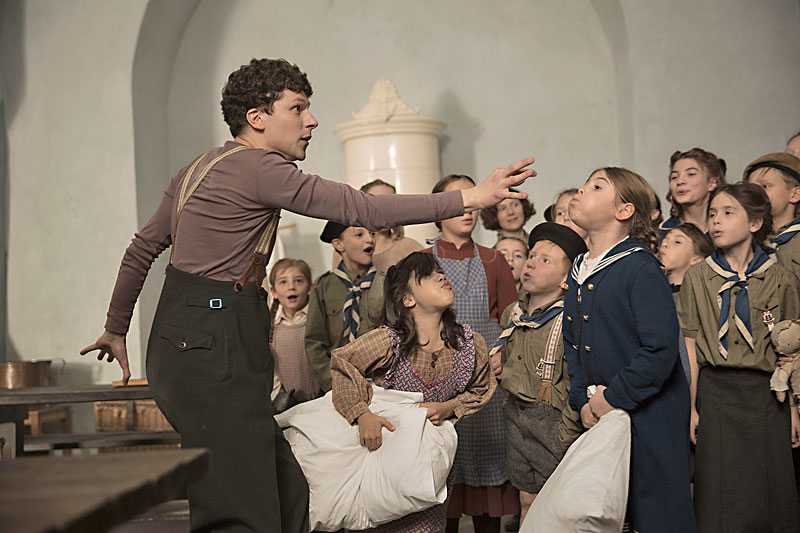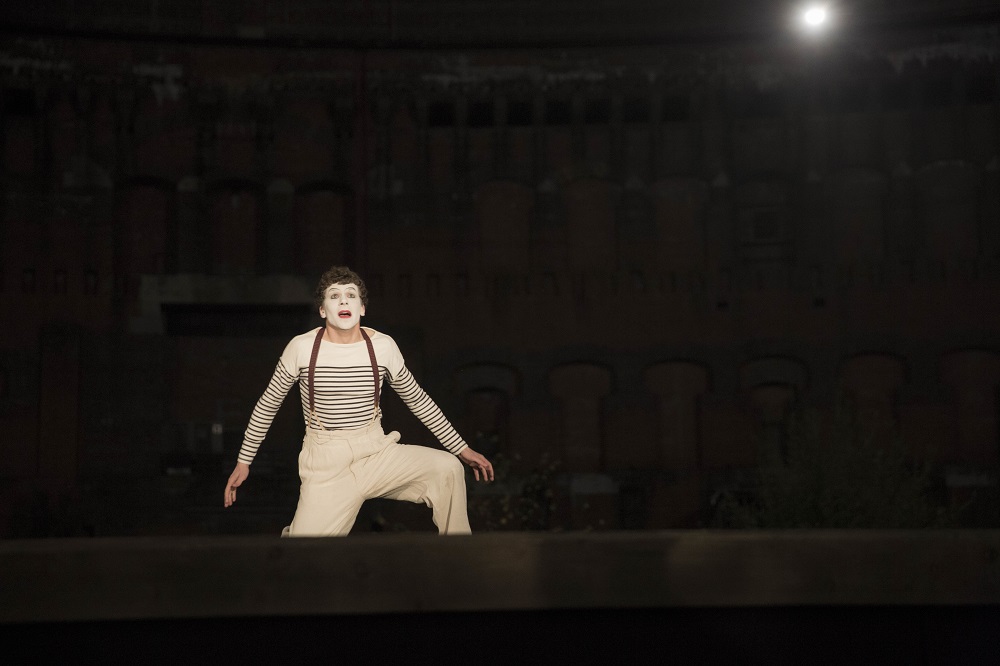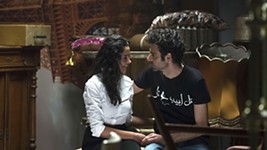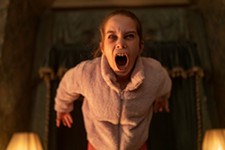Uncover the Forgotten Wartime Heroism of Marcel Marceau in Resistance
Jesse Eisenberg and UT student-turned-filmmaker Jonathan Jakubowicz find strength in silence
By Richard Whittaker, Fri., May 15, 2020

In strife, we find ourselves. That's the story of Resistance, which sees two men revealed in the crucible of war. On one side was Nazi war criminal Klaus Barbie, a monster empowered by the Third Reich. His polar opposite – and the true center of Jonathan Jakubowicz's Resistance – was Marcel Marceau. The famous French mime, whose iconic white-faced creation Bip the Clown captivated generations, was a member of the French Jewish Resistance. Yet, rather than picking up a gun, Marceau smuggled hundreds of orphaned Jewish children across the border into Switzerland, using his art to help distract and calm the children. Jakubowicz said, "That's what makes him the greatest mime of all time."
On May 17, the Austin Jewish Film Festival will hold a free webinar with Jakubowicz and Jesse Eisenberg, who plays the mime and wartime hero who saved lives through unconventional means. It will be a virtual homecoming for Jakubowicz, a former UT-Austin student from Venezuela whose debut feature, Secuestro Express, was executive-produced by local creative force Elizabeth Avellán.
The event comes at a time when we are all thinking more than ever about those that Jakubowicz called "civilian heroes," a sentiment Eisenberg echoed. "Three months ago I don't think we necessarily would be able to predict who would be the heroes of this moment. We wouldn't have thought that the person who works at the grocery store is going to be risking their lives to keep some semblance of society afloat. We wouldn't have thought that the pizza delivery guy is going to be somebody who is risking their health for a social benefit." Similarly, he said, "You wouldn't have thought the mime is going to be able to be a hero. Only in retrospect do you go, of course there are going to be kids who are orphaned who are going to require not only a guardian figure, but somebody who keeps them entertained, and gives them a semblance of normalcy."
When developing the script, Jakubowicz knew that he needed an actor who could provide "a physical performance that goes beyond the script, that takes the goal of going beyond entertaining and moving people through unexpected ways." By happenstance, he learned that Eisenberg's mother had been a children's party clown while the actor was growing up, and the pieces all fit together. "By midway through the script, I was basically writing it for him."
That's why Eisenberg got a most unusual pitch packet from Jakubowicz. He recalled, "I received the movie script, which is typical to receive, and a side-by-side picture of Marcel Marceau and me, which is atypical." He was caught off guard by the physical similarity, and also by the shared history: Their families were from the same part of Poland and had left as part of the Jewish diaspora – the Eisenbergs to New York, the Mengels (Marceau's real name) to Strasbourg. And then, of course, there was his family connection to clowning.
Eisenberg still went through months of formal training in mime. Yet, it wasn't until they got to set, and were working on one vital scene – where Marceau distracts distraught orphans through an early version of his classic routine Walking Against the Wind – that Jakubowicz saw him truly understand what he had learned. "He completely forgot about technique, and started focusing on making sure the children got what he was doing. Part of the reason the scene is so moving is that Jesse is going through the same thing that Marcel went through, which is the realization that technique is second to emotion."
It was a make-or-break scene for Eisenberg as a mime artist, because this is the moment that he has to truly entertain the kids – not just in the performance, but on the set. He'd even rehearsed a dozen back-up improvisations with one of his mime coaches, Tomsa Legierski, all pulled from Marceau's repertoire. "They were fail-safes if the kids weren't laughing," he said. "It really felt like I was using live market research. If the kids like it, then we knew that it would work in the movie. But then it has this other effect, selfishly, that I was doing the right thing. Because even if the technique was slightly off, the fact that the kids were reacting to it was so much more important."
The menace from which they were fleeing was Hauptsturmführer Klaus Barbie, dubbed the Butcher of Lyon for his acts of barbarity and played with chilling fury by Matthias Schweighöfer. That two iconic figures of the mid-20th century – the mime and the murderer – were in the same city at the same time for Eisenberg was less about the men than what the circumstances brought of them. He said, "These two guys were operating in the most heightened of ways – Barbie in the worst possible way, and Marceau in the best possible way."
Jakubowicz goes to great lengths to show them as mirror opposites, but at the same time Barbie is never a cartoon. "Nazis are so often portrayed as this alien force, or these monsters who are completely unrelatable. I think the only way we can ensure that something like this never happens again is to truly understand that these were humans. This was a nation that was completely convinced they were on the right side of history."
Ultimately, Barbie was a savage whose hideous urges were indulged, even lauded, by society. In Marceau, Jakubowicz sees someone for whom his heroic actions and his art are summed up in that one word: resistance. "The essence of miming is using the illusion that some object is offering resistance. You put your hand on a wall that doesn't exist, but the audience can see it because it is offering resistance to the hand. Is resisting fighting, or is resisting survival, or is resisting creating visual elements where nothing exists?"
For Eisenberg, the story of Marceau is not an aberration, but familiar. His lineage is filled with both survivors and victims of the Holocaust, and the difference was often a Marceau: not a larger-than-life figure, but one of those civilian heroes who uses what they have to save a stranger. He said, "Every survivor's story requires some kind of miracle, and some selfless person putting their life on the line."

Austin Chronicle: For a long time, Marcel Marceau was instantly recognizable globally. But there are three elements of this film when it comes to talking about him. First, that there are a lot of people who have forgotten about him, or never knew how important he was as a popular figure. Then there's the aspect of introducing them to this story that they may not know. But then there's a third component, that he was almost the definitional French performer, and a lot of people didn't know he was Jewish.
Jesse Eisenberg: Part of the reason that they're not fully known is that he, personally, was not interested in talking about it. I don't know why. I think I can speculate. There was a certain humility there, in not talking about this heroic thing that he did. And just extrapolating on what I know about Marceau, I think he just wanted to be seen as an artist, and not distract audiences with his personal life – which includes his work during the war.
It's also about his iconic status. His look became synonymous with mime, and there was a period in the Eighties were mime was something that was silly. It was the guy in Central Park who came up to you on a date and was an inconvenience. I think Marceau did everything he could to counteract that trope because he was such an amazing performer. So one of the things this movie does is not only show the beauty of the craft of mime, but how it was used so practically to entertain these children in the most horrific circumstances.
AC: When did you first find the story of his involvement with the Jewish resistance?
Jonathan Jakubowicz: I think the first time I heard it was probably in social media. There's this site called Open Culture that's always filled with very interesting stuff, and I remember that they mentioned that, and I had no idea either. First of all, I had no idea that Marcel Marceau was Jewish, and the notion that he was heroic in the war was unbelievable to me, and immediately felt like a movie. So I started doing research, and I realized that it wasn't really a secret. The information was there. He just didn't see himself as a hero. He always downplayed even to himself what he did.
There's a very emotional speech he gave when he received the Wallenberg Medal of Honor. He says, when you see millions of people dying around you, there's no way that you feel important because you save dozens, or even hundreds. Very late in his life, he realized he did something very important, and that's when he began to share it.
AC: That's something that's quite common, that a lot of people who were involved in World War II didn't talk about it. It's something they put behind them, so how did you get the details you did?
JJ: When I was premiering my prior film, Hands of Stone, at the Cannes Film Festival, I was able to track down Georges Loinger, who was the first cousin of Marcel Marceau and the head of the Jewish Boyscouts of France during this entire operation. He was truly at the center of it all, and he was the one who invited Marcel to join at the beginning of the movie. I was able to meet with him in Paris – he was 106 at the time – and he started telling me a lot of what you see in the film. He had a terrific brain, and he remembered everything, and it was such an incredible story that I felt there was absolutely nothing else I could do with my life. I couldn't stop until I'd finished it.
AC: You're not just depicting mime, but a particular mime artist at a very specific moment in his creative career.
JE: Luckily, I had this incredible teacher, [Mime Theater Studios instructor and choreographer] Lorin Eric Salm who was not only a student of Marceau in France, but an unofficial chronicler of Marceau's life. So I had this wonderful two-pronged education. One was the technical craft of my performance, and the other was this almost academic history of not only the mime, but the origins of Marceau's specific work, and how he changed the craft.
AC: A lot of people don't realize how formal mime is, how much training there is, and even what is and isn't considered mime.
JJ: Lorin read the script, there was a scene where Marcel got onto stilts, and he told me, "That's not miming, that's clowning."
He'd teach Jesse very specific elements that Marcel used to do, even mistakes that Marcel considered mistakes in his own technique. ... There were elements that made the discipline specific to Marcel, some of the movements and some of the philosophy behind it: Make the impossible possible, and the invisible visible. It's a philosophy that Marcel used to teach his own students. It's the definition of what he's doing onscreen in our movie, but also in every one of his performances.
JE: To your point about the specificity and dogmatism in some of these areas of mime, I was doing certain things in the movie that only Marceau would do. There was a certain way he held his fingers together – in fact, he dissuaded his students from copying this [in] particular, whether it was because he wanted to teach them a more pure form or to keep it to himself, I don't know. But there's a great history of mime and when you delve into it, it's as serious a craft as any art form.
AC: And mime, like a lot of physical theatre, is very precise, where every movement has to be measured.
JE: My mother, when I was growing up, she performed clowning for children. My dad was a social psychology professor so he was able to assess what things about clowning were scary to kids, from a sociological perspective, so my mother was able to employ those techniques. So, for example, big shoes and a fake nose were very off-putting to children, so while she was doing this very silly performance, she did it with such precision. And, similarly, Marceau was an expert in precision. I think he performed 300 nights a year, even into his older age. He was so unbelievably precise, and in a way that's deceptive to an audience. They are experiencing mime as a kind of silly, abstract art form, but behind it was the precision of Baryshnikov. And sometimes as an actor you're performing naturalistic material, but with great actors they're performing naturalism with great precision, and it comes from training and experience. The real skill set is in doing it in such a way that the audience is not aware of your training.
Austin Jewish Film Festival presents a webinar with Resistance director Jonathan Jakubowicz and star Jesse Eisenberg, Sunday, May 17, 7:30pm. Register for free at www.goelevent.com/AustinJFF/e/ResistanceDirectorandCastEvent.
Resistance is available on VOD: find the full list of providers here.










